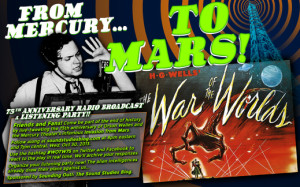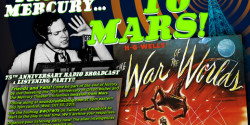 On Wednesday, radio fans all over the globe celebrated the 75th anniversary of the famed “War of the Worlds” broadcast, a radio drama directed and narrated by Orson Welles that presented a chilling H.G. Wells story about a Martian invasion. At the same time, there are questions as to whether or not listeners were actually tricked by the broadcast (despite press accounts about widespread panic).
On Wednesday, radio fans all over the globe celebrated the 75th anniversary of the famed “War of the Worlds” broadcast, a radio drama directed and narrated by Orson Welles that presented a chilling H.G. Wells story about a Martian invasion. At the same time, there are questions as to whether or not listeners were actually tricked by the broadcast (despite press accounts about widespread panic).
Several radio stations rebroadcast “War of the Worlds” on Wednesday night and a Facebook group organized by scholars from the Sounding Out! blog and Antenna was a focal point for fans planning to listen in. The group organized a social media party, encouraging listeners to listen simultaneously to the 8pm Eastern time broadcast on WHRW and live tweet during the broadcast (see the fun at #WOTW75).
Additionally, a couple of west coast radio stations played War of the Worlds later in the evening, with a broadcast on KPCC at 8pm Pacific (as well as a live listening party) and a broadcast on KFJC at 9pm Pacific (preceded by a 30 minute interview with old time radio collector Randy Riddle, who unearthed a rare version of the broadcast). At Northwestern University, a listening party was followed by a fireside discussion with media critic Robert Feder and Northwestern professor Jacob Smith. In the weeks to come, more discussion about the social impact of War of the Worlds will happen on Sounding Out and on Antenna.
I tuned in to much of the KFJC broadcast live. As I listened, I kept asking myself if I would have been fooled by the broadcast. Lore has it that people were duped and became panicked because they believed the fake news bulletins in the Mercury Theatre production and thought there was a Martian invasion in New Jersey.
The beginning of the broadcast (as well as the end) makes it clear that the show is a radio drama, so it’s hard to imagine being fooled if one tuned in from the beginning. What was chilling to me, however, was an extended section of dead air. As a DJ, I was alarmed, but also confused. I happened to be listening on the KFJC app on my phone and I kept checking to see if my connection had timed out. However, if I’d been listening on a terrestrial radio, the effect would have been far more dramatic and unnerving. (Note: there may have been some technical difficulties at the station. It’s fascinating that modern technology can add to the confusion over how a piece was designed to be heard.)
With this as a backdrop, it was interesting to read a piece in Slate this week which pretty much debunks the idea that the “War of the World” broadcast led to massive panic and hysteria. According to the article, the listening audience for the program was small and media accounts of panicked audience reactions were exaggerated. The piece states,
“If War of the Worlds had in fact caused the widespread terror we’ve been told it did, you’d expect CBS and Welles to have been reprimanded for their actions. But that wasn’t the case. It’s true that Federal Communications Commission chairman Frank McNinch quickly obtained informal agreement from the radio networks that fictional news ‘flashes’ would not be used again, but no official rulings or regulations were promulgated. Nor were CBS or Welles sanctioned in any manner. (In fact, the FCC prohibited complaints about the program from being used in license renewal hearings.) For the FCC and the networks, the sensationalized newspaper reports were at worst a nuisance. Janet Jackson’s 2004 ‘wardrobe malfunction’ remains far more significant in the history of broadcast regulation than Orson Welles’ trickery.”
Did you tune in to the anniversary broadcast on Wednesday? Do you think you would have been fooled into thinking that there was a Martian invasion if you’d somehow missed the beginning and ending of the broadcast?



